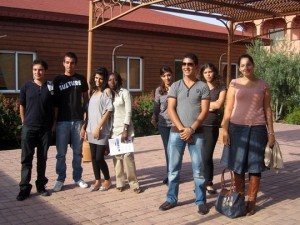 Yusuf Kocoglu, Assistant Professor at the Laboratory for Applied Economics for Development (LEAD), at the University of Sud Toulon-Var helped draw up the annual FEMISE report for 2011 on the Euro-Mediterranean partnership. In the document entitled “A new Mediterranean region: towards achieving fundamental transition”, he analyses the problems of youth employment in the Mediterranean basin.
Yusuf Kocoglu, Assistant Professor at the Laboratory for Applied Economics for Development (LEAD), at the University of Sud Toulon-Var helped draw up the annual FEMISE report for 2011 on the Euro-Mediterranean partnership. In the document entitled “A new Mediterranean region: towards achieving fundamental transition”, he analyses the problems of youth employment in the Mediterranean basin.
What place do young people have in society in MENA countries?
Not much compared to their demographic weight. MENA countries have a very patriarchal social structure that leaves little room for new generations. Social progress is slow (except for a few privileges). However, following the events of the Arab Spring, leaders understand the need to give young people more room, both economically and politically.
Revolution came from young people; do you think they have a place in the governments that are gradually being put in place in the different countries of the Mediterranean basin?
It is very difficult to say what place young people, who were the driving force behind the revolts, will have. Elections in Tunisia have not led to radical reform for the young except for a few posts for the leaders. The current events in Egypt show that change is hard to achieve. However, a start has been made in Morocco with a significant participation of young people in the elections held on 25th November (one quarter of the candidates is under 35 years of age) and the expected entry to parliament by quota of people under 40.
Young people leaving the education system without qualifications are experiencing significant difficulties in finding work.
What are the ways to reduce unemployment in 20-25 year-olds and in particular the social exclusion of graduates?
As indicated in the FEMISE annual report, this issue requires long-term, systematic measures. We must review both the production system to raise the production chain and thus create a demand for a more skilled workforce. Because one of the major problems in these countries is the low demand for skilled jobs in the private sector. We must also rethink the education system at university-level, orienting it more towards the needs of business, developing short, professional training courses and review the funding system for micro-enterprises.
As regards the unskilled, in the annual report you mention the Second Chance School. What is this?
Young people leaving the education system without qualifications are experiencing significant difficulties in finding work. Second Chance Schools, whose concept was proposed in the European White Paper “Teaching and Learning, towards the Learning society”, target young adults leaving school without any qualifications. These schools offer a common space featuring a training centre, business centre and social hub that provides young people with a refresher course on basic, compulsory education and helps them develop a career plan appropriate to their abilities.
Partner companies offer them with work experience via internships and sandwich courses, and the social hub handles any social problems they may have. In France 30 schools operate on 100 sites with a 60% success rate in looking for employment and resumption of skills training.
The University system in particular has remained too rigid
What is your analysis of the education and university systems? Do you think they are unsuited to the needs of businesses?
The University system in particular has remained too rigid and has not kept up with the rapidly changing economic environment in MENA countries. Standardised university education no longer fits the model that used to train civil servants, especially since the 1990s and the establishment of public policies to reduce or at least control the weight of the public sector in the economy. The quality of university education is also an important issue in that business leaders give little credit to the value of a university degree.
Do young people have a central role in the context of knowledge economy?
With the FEMISE report, we did want to highlight the primary role of young people to access the knowledge economy and raise national output. However, these young people must be convinced that studying will lead to high-quality employment with positive prospects for development. The policy should make this prospect credible by promoting the integration of young graduates and we then fall back on issues related to developments in sectors with high added value.
Could you tell us a little about Turkey?
Turkey is somewhat different, insofar as their economic output is more diverse than in southern Mediterranean countries, with dynamic sectors that employ middle management.
In addition, the education system is selective. As soon as they leave school, students are tested and the results decide whether they have access to the most prestigious High Schools, or not. The same goes for university entrance.
Selection made in this way limits the problem of mass orientation in some sectors, as in the Maghreb countries, for example. However, the Turkish system produces significant inequalities in access to education, the most successful young people are from the wealthiest families who have been able to finance additional private tuition.
Download the Femise annual report
Photo Econostrum-MPV
Article by Nathalie Bureau du Colombier, Econostrum. It belongs to a series of articles published in the context of the partnership between Econostrum and Femise for the year 2011. These articles also feed the “Grand Angle” part of the Econostrum Website. You can find this topic and all information at the following address: www.econostrum.info. Registration for the Econostrum newsletter is available here: http://www.econostrum.info/subscription/

